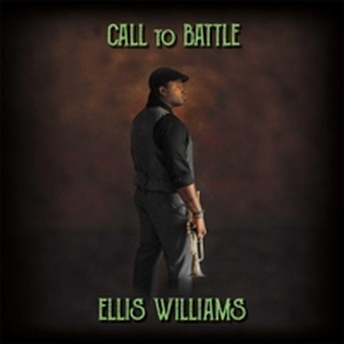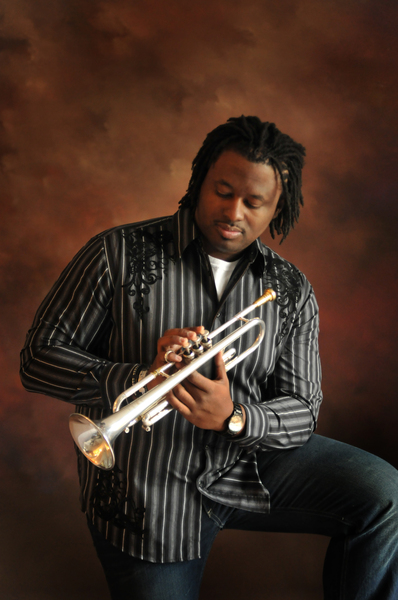
With Williams and Piland are Donovan Capron (organ, synthesizer), Darius Mines (organ, Fender Rhodes), David Gross (bass), Andy Williams (drums), Bradley Hairston (drums) and Elena Chavez with the background vocals. Each and every one of these artists have brought their best skills and most intense dedication to Williams’ project. This is a gathering of A-gamers.
After Williams’ spoken summons in the album’s opening This is the Call, the band, the listener, all of nature feel the compelling prophetic declaration. And each responds according to their own spirit and talent—even if just to listen.
Is the music Jazz or Fusion or Funk, Soul or Pop or Gospel? All of those. And none of those. Forget the style and the structure and concentrate on the message and you will discover what it is. I won’t tell you. Find your own answer. I have mine.
The hard drive of the band behind Williams’ impressive trumpet work recalls Chase from the early 1970s. Powerful.
The clarion This is the Call ends with a brilliant flash of horn and bridges seamlessly into Braving Darkness with Piland, Hairston, Gross and Capron all in full-throated affirmation of the Funk. The rhythm section nails the groove from the very opening. Ellis Williams’ trumpet is like a bugler’s charge. This is not just braving the darkness; it is a frontal assault on what would derail us.
Piland’s guitar contribution is exquisite and Hairston’s aggressive drums with Capron’s great synthesizer work all create a frame for the stunning trumpet of Williams. Beneath it all is Gross’ fine bass line. These guys bring the heat, rousing the light.
This is followed by My Closest Friend. Williams brings the vocals alongside his trumpet in this track. His vocal talents are impressive and evocative. After an anguished lament, the song breaks into a straight Soul line before the return of the lament. This was a great track.
Fixed on the Groove is exactly what the title describes. Darius Mines, David Gross and Andy Williams are featured and they indeed fix on the groove. Ellis Williams is a talented and forthright horn player. His phrasing is precise and so emotional.

The pace and groove changes for the Funk on Where Do We Go from Here? Ellis’ vocals are so well supported by Davis Gross’ bass and Andy Williams’ drums. Gross outdoes himself with the bass line. The trumpet interlude serves as the call to follow. Call him the Pied Trumpeter. So help me, I couldn’t get enough of this track. It is the midway point of the album and acts like the pinnacle of this album’s mountain range.
Mystic Safari, at 8:05, is the longest piece on the album and that’s fine with me. The beautiful piano work accompanying the muted-trumpet is gorgeous. It is Jazzy Soul at its finest. The spiritual odyssey traverses lush sonic landscapes by means of ritual rhythms and a gregarious trumpet. Think of Kitaro’s Silk Road being hijacked by Freddie Hubbard. I mean that in a good way.
Call to Battle, the title track, features David Gross and Andy Williams with Elena Chavez on background vocals. It is strident and determined. It is Crusader Gospel music. I like the vocals, Ellis in front and Chavez behind. Then comes the smoking trumpet and things get exciting. Good Lord (yeah, I said it), this guy can play.
Excalibur is a cool synthesized track with Ellis and Piland working it from their ends. If one needs a weapon for battle, it doesn’t get much better than Arthur’s sword, Excalibur. And things don’t get much better than this track, either. The trumpet above the synthesizer and drum machine is well-exposed and focused.
This is following by Looking Towards Tomorrow, again featuring Gross and Andy Williams. The Reggae-Jazz intonations are cool and Ellis’ working of the vocals is fascinating. The Reggae is perfect for the expression of hope in the midst of pain; it speaks of commitment.
The album concludes with Unchained. In an album filled with expressions of hope, struggle and pain, “unchained” is the most longed-for condition. Capron recreates the feel of Rick Wakeman’s Myths and Legends of King Arthur with the expressive keyboards, enhanced by Piland’s grand guitar work, which speak of liberation. The trumpet is almost like the call of the Archangel. It is a satisfying end.
Ellis Williams’ Call to Battle is an album of spiritual adventure and examination. He pushes himself into different avenues and pathways, always searching and always ready for the confrontations that await us within and without. He drives himself but he drives the listener, as well. It is a call for self-examination and the music drives the mediation. The spiritual call to arms must always begin on the inside. Williams has made us search ourselves.
~Travis Rogers, Jr. is The Jazz Owl
 RSS Feed
RSS Feed
